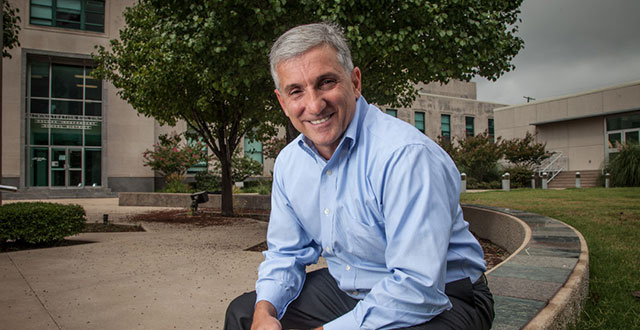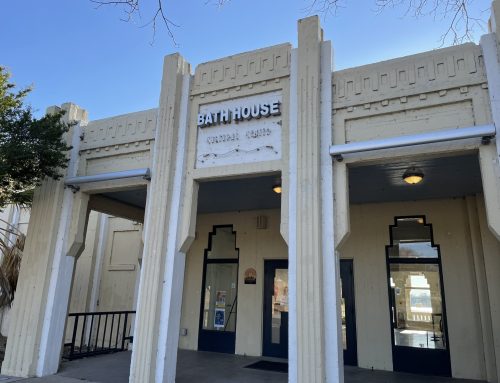Dan Micciche lives on the east side of White Rock Lake in one of the few houses in Dallas with a view of the water. If you ask to meet him for lunch, he insists on a restaurant east of the lake, evangelizing its assets as on par with the glossier west side. Talk to Micciche (pronounced Mitch-kay) for just a few minutes, and it becomes evident that he is an advocate for the underdog — nowhere more so than in his position on the Dallas ISD board of trustees. In a little more than two years, he’s already made his mark as a voice for the school district’s poorest children, and he’s bound and determined to recruit neighbors to the cause.
You live right on the lake, correct?
If you come to my backyard, you can actually see water and some sailboats, but mostly you see the park. I’m in the Emerald Isle subdivision, and my backyard overlooks the softball fields at Winfrey Point and the site of the former German prison camp. (I was floored when I heard that story for the first time.) I’ve lived in my house for about 20 years, and lived in Lakewood, just adjacent to where Arboretum Village is, for about nine years before that.
Are you a lake ‘user’?
I used to be a runner; now I’m a jogger. My first marathon was the White Rock Marathon in 1984, so I’ve always appreciated being near the lake. I did triathlons, too, and competed against Lance Armstrong in the ’80s — meaning I was in the same race he was in. His name was very near the top; mine was very near the bottom.
So you’re a cyclist, too?
I have a bike and ride around the lake, but now I usually ride to restaurants — to The Lot and the Lake House, which are pretty convenient off the trail. I ride my bike at a picnic pace as opposed to one of those faster riders you hate if you’re a walker or a runner.
Where do you find yourself on the spectrum between keeping the lake as-is and developing it?
We don’t need to be paving any more parkland. We don’t need lakefront parking, and the lake is unique — it’s just a wonderful place to be, and there’s plenty of land not in the park that can be developed.
We hear that Dallas ISD isn’t your only civic passion; you’re an avid library supporter, too?
I go to the city’s Arts, Culture and Libraries committee meetings to see where they’re headed. The last time I went, they were aiming for last place again in terms of the number of hours libraries are open compared to every other city in the Metroplex and all peer cities. And not because they wanted to be in last place. The city council does a lot to aid the school district in areas like pre-K and summer reading programs, but in their primary area of responsibility for education, they don’t get a passing grade. If every other city can figure out a way to keep the libraries open more than 40 hours a week, and we can’t do that in Dallas, then we have a problem.
This is a big deal to you.
I’ve been pretty cranky about this issue for a long time. Libraries are places where people go to improve themselves. They’re safe places for kids to learn and dream. They’re places where people who are self-motivated can use the internet to look for jobs, earn degrees, learn English. You can live a long time in Dallas and not know we’re a high-poverty city. Are we going to recognize that we are a high-poverty city, that we are a high-poverty school district? Are we going to support education, or are we going to be at the bottom of the list? We have to fund those libraries. To open the libraries back up again, you would have to take the city’s general fund budget, $1.1 billion, and find 1 percent savings to fund the $10 or $11 million necessary to get us back to the funding we had in the early 2000s. We either need to find the savings or be willing to ask the average homeowner to fork over $25 more a year for libraries. Think about it this way: When your internet is out, how do you feel? You may not need the library as much as you once did, but it means that the people at the bottom of the economic scale need it even more.
Why do we overlook poverty in Dallas?
Where we live, you can drive back and forth to work and never see it. I give Mayor Rawlings in particular a lot of credit for recognizing and trying to do things about the high poverty in our city. In fact, 90 percent of our [DISD] kids qualify for free or reduced school meals [the key indicator of schoolchildren’s poverty, based on families’ annual income], and our school district is higher poverty than New York, Los Angeles, Houston, Detroit, Newark — places that you don’t think about being nearly as prosperous as Dallas. I wrote about this in a Dallas Morning News op-ed in November 2012, about six months after I was elected to the board, and an Austin reporter saw that statement. Having formerly been a reporter in Dallas, he could not believe that was true. It just didn’t sound right. So he fact-checked me using a ‘truth meter.’ He gave me a ‘mostly true’ rating because we were tied with Newark or Detroit in one category. The thrust of the story was, here you have a reporter from Dallas who is an intelligent guy, but even he was not aware of the level of poverty in our city.
When did you become aware of it?
It really hit me in 2005. That was the first year my law firm, Akin Gump, did our school partnership program with DISD at Fannin Elementary. We were just shocked. The school was 99 percent free or reduced lunch; these kids lived in deep poverty. I’ve been subsequently shocked when some PTA moms from Sanger Elementary came and told me kids were going hungry over the weekend, and they’ve started their own backpack program [to send food home]. One of the teachers noticed it, got the counselor involved, and I think they identified 50 kids, including siblings, at Sanger who weren’t eating over the weekend. Or, when I was at Hillcrest High School giving out graduation diplomas (that’s the most fun thing about being on the school board), a counselor was handing them to me to hand to the kids, and as one of them starts to walk up, all of a sudden the counselor just screams. I’m thinking, ‘What’s wrong?’ She whispers to me, ‘He’s homeless.’ It was an exclamation of joy. And then you have to imagine what it took to get him there. You have this intellectual awareness of poverty, but when you hear these stories, it hits you all over again.
Why should we care about these kids when they aren’t ours?
Every child deserves an excellent education. That’s it. There’s no reason why a child growing up in this country shouldn’t get an excellent education. Also — and this is where altruism and self-interest merge — if we want to have a city and neighborhoods that grow and prosper, we have to have an educated workforce. If we want to have property values that are maintained and grow, we have to have an educated workforce. The worst thing we can do is have thousands of kids leave our public schools with no hope of success.
What do you think of the home rule effort?
I don’t think that the home rule idea is a good one. I do credit the people who are behind it with good intentions, but I don’t think it’s going to help. The problems in our school district will still be there — we’ll still have the same kids in the same buildings with the same challenges, and we need to address parental education, to help parents understand what they need to do to start educating their children in the first few years of their lives. We need to improve and expand pre-K education. We need to recruit volunteer tutors and get the community involved in the schools. It’s all about helping kids who grew up in poverty to catch up.
Seems like that might take a while.
It will, but one thing that is not widely known is the district has the largest HIPPY [Home Instruction for Parents of Preschool Youngsters] program in the nation, and we’re expanding it. We’re about to review a plan by the administration that will greatly expand pre-K, which is state-funded for half days. The new volunteer tutoring program [read more on page 50] will make a difference in helping kids catch up, but will also make a difference in the way communities view those schools and the challenges in those schools. I think ultimately people will be talking about them as ‘our schools’ rather than ‘that DISD school.’ I think it will also really enhance the way people think about our DISD teachers and staff, the challenges they face and their extraordinary commitment to education. That’s certainly what happened with our school partnership between Akin Gump and Fannin. If you’re middle-class and you work Downtown, it’s not unusual to have an unfavorable opinion of DISD.
Did you?
Yeah, a little bit, but once you get in the classrooms and start working with kids, and you realize there are a lot of children who don’t know how to read or write their names — they just kind of show up on DISD’s doorstep without the benefit of all the advantages that a child in a middle-class family has — then you have a much greater sense of respect for the job our teachers do. I always think of my nephew, who is 2 years old, playing word games on his iPad and contrast that with kids like the 5- and 6-year-olds I saw that came to school not knowing their alphabet. We have a lot of kids who started out behind, and we need to catch them up.
This interview has been edited for clarity and brevity.






